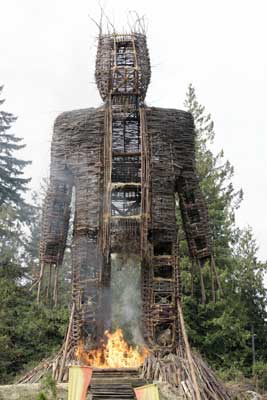
 The
lesson one can learn in watching a remake fall so far off the mark is this:
don't remove the thing(s) that made the original film good.
The
lesson one can learn in watching a remake fall so far off the mark is this:
don't remove the thing(s) that made the original film good.
The original 1973
film of The Wicker Man is a cult classic, and well-revered in some
circles as a seminal horror film, but it is largely unknown to most audiences of
today. While a remake probably didn't stand a chance with those that
consider the older version a great film, if the main themes and events were to
have been faithfully replicated, new audiences would have still probably been
riveted by the messages of faith, zealotry, and morality. Those themes are
part and parcel of what makes The Wicker Man an enriching and absorbing
experience, and the removal of them would make the film a rudimentary mystery
without any relevance. Sadly, this is precisely what happened with Neil
LaBute's (The Shape of Things,
Nurse Betty) reinterpretation, which strips
away believable religious fervor in favor of farfetched feminist story elements
(some will claim it's just more example of LaBute's misogyny) and mild generic
horror clichés that leave no lasting impression.
Nicolas Cage (World
Trade Center, The Weather Man) stars as
Edward Malus, a California Highway Patrol officer, still haunted by the visions
he had of a freak accident he witnessed, where he tried to save a mother and
daughter from certain death, only to discover their bodies are missing from the
wreckage. Months later, Malus receives a ponderous note from an
ex-girlfriend (Beahan, Flightplan)
asking him to come out to an obscure island off of the coast of Washington
state, where her daughter has apparently gone missing. Malus travels to
the exclusive island, where he is less than welcome, to find a colony of
predominantly women (men are mere workers and assistants here) who claim no
personal knowledge of the missing girl's existence. As Malus digs deeper,
he discovers just how bizarre the inhabitants of the island truly are, including
their potential belief in burning someone alive in order to ensure the continued
prosperity of their valued honey production.
Directed and adapted by LaBute, the auteur
who has thus far made a career making films about gender roles and their
politics, The Wicker Man will probably only merit strong interest by
those that have followed LaBute's career than those that have actually read the
book or enjoyed the original film. Even though LaBute continues themes
he'd been presenting in films for years, viewers that are unfamiliar will have
difficulty maintaining adequate interest in this as a straightforward film, with
its bizarre "bee colony" subtext that at times makes little practical sense.
While the change in the main thrust of the religion certainly is interesting, it
just isn't presented plausibly enough to overcome disbelief suspension,
resulting in a clunky, overreaching climax that lacks the haunting, horrific
qualities that left an indelible impression in the 1973 version.
With a clunky delivery, not many scares (or
even moments of genuine unease), unconvincing religious depictions, and a lack
of emotional connection to it, The Wicker Man is far from impressive in
any particular direction to recommend to anyone but LaBute gender role fanatics.
Like the wicker man featured at the end of the film, LaBute sticks what was good
about the freethinking original and stuffs it into a bizarre, wooden construct,
then proceeds to burn it all to Hell in the pursuit of his own misguided ideals.
Your money and two hours of your time are not worth the sacrifice.
Qwipster's rating:





©2006 Vince Leo

